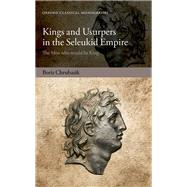Kings and Usurpers in the Seleukid Empire The Men who would be King
, by Chrubasik, Boris- ISBN: 9780198786924 | 0198786921
- Cover: Hardcover
- Copyright: 12/27/2016
Kings and Usurpers in the Seleukid Empire: The Men who would be King focuses on ideas of kingship and power in the Seleukid empire, the largest of the successor states of Alexander the Great. Exploring the question of how a man becomes a king, it specifically examines the role of usurpers in this particular kingdom--those who attempted to become king, and who were labelled as rebels by ancient authors after their demise--by placing these individuals in their appropriate historical contexts through careful analysis of the literary, numismatic, and epigraphic material.
By writing about kings and rebels, literary accounts make a clear statement about who had the right to rule and who did not, and the Seleukid kings actively fostered their own images of this right throughout the third and second centuries BCE. However, what emerges from the documentary evidence is a revelatory picture of a political landscape in which kings and those who would be kings were in constant competition to persuade whole cities and armies that they were the only plausible monarch, and of a right to rule that, advanced and refuted on so many sides, simply did not exist. Through careful analysis, this volume advances a new political history of the Seleukid empire that is predicated on social power, redefining the role of the king as only one of several players within the social world and offering new approaches to the interpretation of the relationship between these individuals themselves and with the empire they sought to rule. In doing so, it both questions the current consensus on the Seleukid state, arguing instead that despite its many strong rulers the empire was structurally weak, and offers a new approach to writing political history of the ancient world.
By writing about kings and rebels, literary accounts make a clear statement about who had the right to rule and who did not, and the Seleukid kings actively fostered their own images of this right throughout the third and second centuries BCE. However, what emerges from the documentary evidence is a revelatory picture of a political landscape in which kings and those who would be kings were in constant competition to persuade whole cities and armies that they were the only plausible monarch, and of a right to rule that, advanced and refuted on so many sides, simply did not exist. Through careful analysis, this volume advances a new political history of the Seleukid empire that is predicated on social power, redefining the role of the king as only one of several players within the social world and offering new approaches to the interpretation of the relationship between these individuals themselves and with the empire they sought to rule. In doing so, it both questions the current consensus on the Seleukid state, arguing instead that despite its many strong rulers the empire was structurally weak, and offers a new approach to writing political history of the ancient world.






